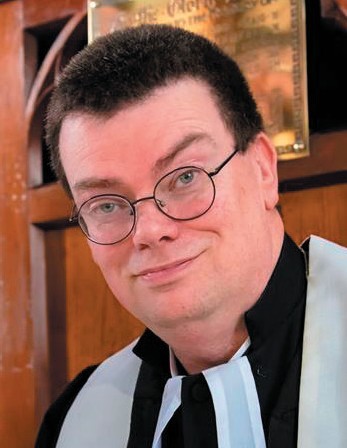The Big Question
This month’s question is: ‘How do you feel about the practice of tithing?

Marian Macintyre, Guild National Convener, member, Lerwick and Bressay Parish Church, Shetland

The Rev Andy Braunston, minister, Barrhead, Shawlands and Stewarton United Reformed Churches, Glasgow
“Tithing, as a ‘joyful response to God for his goodness’, is a concept I grew up with. My father was a minister in the United Free Church of Scotland, a denomination which encouraged the practice of tithing, and of ‘sacrificial giving’.
“I believe that in 2004, the General Assembly revisited the issue of tithing, but there was no appetite at that time for it.
“I believe an offering is a response, and the amount you give is your choice. ‘Free-will’ offering envelopes are available in many churches, and you are encouraged to ‘give as you are able’, and some people may be moved to tithe, or to give sacrificially.
“I think that what a person gives back in response to God should be measured, not just in terms of money, but in a ‘fitting proportion of time, talents and money’ for the work of the Gospel in the world. Many people give more than a tenth of any given week, in Christian service.
“Members’ attitudes towards money matters are more informed today, and so both the local and national church need to be clear on their budgeting and accountable for their spending. It is incumbent on the church to communicate in those terms, and so I would be hopeful that the needs of the church in its mission to the world would be met.
“Members are motivated to give generously, even sacrificially, when they are excited and inspired by how they see their money being used. Will they be inspired and excited enough by the church’s vision of its mission to give their ‘tithe’ and more? If it’s just a ‘maintenance’ model and not a ‘mission’ model, I don’t believe they will!”
“I have a rather mixed religious pedigree as I grew up a Catholic, attended a charismatic evangelical church in my teens and am now a minister in the United Reformed Church.
“As a Catholic I was taught to ‘provide for the care of our pastors’ through giving. This wasn’t, however, a major emphasis.
“Within the evangelical church I attended there was a considerable emphasis on tithing.
“This wasn’t taught as an end in itself nor as a way of balancing the congregation’s budget but as a spiritual discipline.
“The practice of tithing has stayed with me over the intervening years despite moving on from other areas of evangelical theology and practice.
“I’ve realised that money can be toxic unless we dilute it a little; the consumerism of our society slowly kills our consciences. Tithing helps revive us and makes us aware of the needs that surround us.
“Tithing helps us become less selfish, more aware that we have responsibilities to others and enables us to become a little more generous.
“We still tithe.
“I give a quarter of my tithe to each of the three churches I serve in and around Glasgow.
“The final quarter is given to a friend who is a destitute asylum seeker still waiting, after two long years, for his case to be looked at. “Giving is good for us; it can change the world.”

Bea Nicholson, Elder, Saltcoats: St Cuthbert’s

Rachel Henderson, Selkirk Parish Church, currently Brittany, France

Bill Stevenson, Brigade Secretary, Boys’ Brigade and elder, Traprain, East Lothian
“The term ‘tithing’ is a pretty antiquated term and can raise hackles, so should probably be replaced nowadays with ‘give what you can’.
“Giving 10 per cent of produce or money is probably a good benchmark to strive towards in an ideal world. Although traditionally the expectation might have been that only the church benefitted, many folk may give a percentage to various charities or good causes, including the church and, if they can do so, will Gift Aid their contributions so that tax can be claimed back by the charities too.
“The problem with trying to mandate tithing is that some people struggle financially already and may feel pressured to contribute or might even turn away!
“If for instance, you could use a broader viewpoint that would include time instead of money, maybe people would feel more comfortable. “Donating practical skills is hugely beneficial to both giver and receiver. A concern I would have is how would anyone know what 10 percent means? Income is a very private matter and people may feel that they are being unfairly judged if their contribution appears small. Do we mean a percentage of just their disposable income or free time? Maybe a good discussion point in a group but probably not from the pulpit!
“We do need, somehow, to encourage our congregations to remember Jesus’ call to us all that mission is what we should be doing. And, that, as we all know, takes money.”
“It is hard to grab the idea that giving 10% of your income at a time when it is costing 25% more to put food on your table is what God really wants for ‘His/her’ people.
“We are faced every day with fund raisers for everything and the rise in ‘gofundme’ pages tears at our heart almost every time we look online.
“So – when you have been brought up with the ‘bailiffs at the offering plate’ – what do you do when your 10% means that you can’t afford to eat this week ….?
“Or, ‘square it’ with God and see what else you can offer instead?
“There are theological arguments on the idea of tithing, which take you through the system of the Old Testament into the ‘Gifts of the Spirit’ of the early church.
“Maybe, for many people, this is the way to go forward and to enable them to share their abilities, and make sure that they aren’t alienated from the church by feelings of guilt during collection.
“Most though, it must be remembered, will be embarrassed to say that they haven’t got any money.
“So, it is up to the leaders, deacons, Sunday School leaders, as well as the person next to them in the pew to tease it out of them what they do have
“For example, some of us have the gift of the gab that we can ask for money from anyone and get it – which is kinda useful!”
“I suppose like most Scots I am rather reticent about discussing money.
“I was always taught that asking others about their salary/pay level was not good form. However, times change: years ago I would never have predicted that in 2019 my offerings to the kirk would be mainly through standing orders rather than free will offering envelopes.
“Tithing is of course based on wellfounded biblical principles. The idea of giving a proportion of your crops/income in ancient times appears sound, but we need to remember that it was also common practice to make offerings of animals or birds at the temple as well.
“As an elder at Traprain in East Lothian I don’t think I have ever seen anything moving in the offering plate yet! However, times change, and I never thought years ago that the offerings I now make to the kirk are mainly through standing orders rather than free will offering envelopes.
“Modern society is quite different, and we need to remember that taxes and other deductions from our pay already go to support the Health Service and poorer members of society. When we consider tithing today are we thinking about gross income or a share of disposable income?
“There are also other ways to give to God and the church. People devote countless hours to their local congregation whether it is assisting with a voluntary organisation, food bank or preparing the Kirk Session minutes. There are different ways to give and I am sure our Lord is grateful for all we do in his name.”
Like us on Facebook at facebook.com/lifeandwork